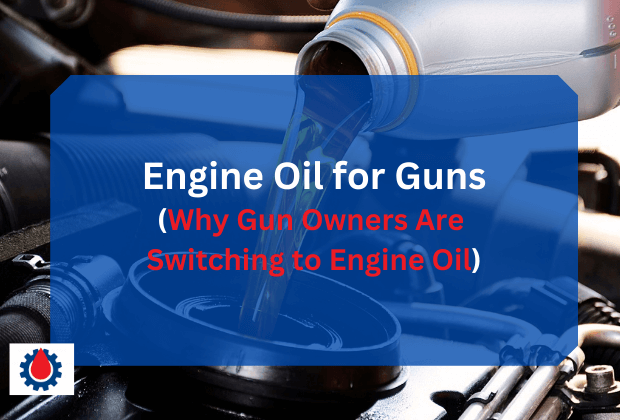When it comes to maintaining firearms, ensuring longevity and performance is key. While specialized gun oils and lubricants dominate the market, many gun enthusiasts and professionals have turned to an unexpected alternative: engine oil.
This guide will explore the practical use of engine oil for guns, examining its benefits, limitations, and application techniques for firearm maintenance.
Engine Oil for Guns
1. Lucas Extreme Duty Gun Oil & Grease Kit
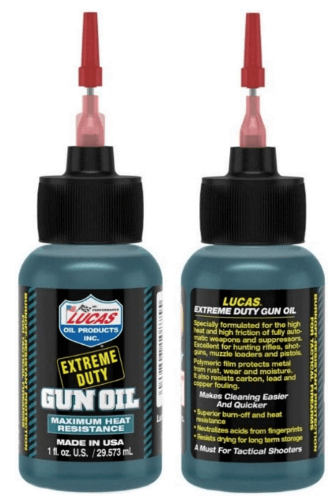
Made in the U.S.A. and designed for heavy-duty use, this kit is ideal for high heat and high-volume shooting, including full-auto firearms, short-barreled rifles, and suppressors.
Features:
- Superior burn-off resistance.
- Forms a protective polymeric film against wear, rust, and moisture.
- Resists carbon, lead, and copper fouling.
- Operates effectively in temperatures from –38 °F to 400 °F.
2. Radcolube 3-in-1 CLP Gun Oil
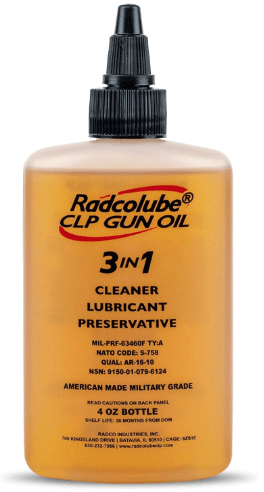
A versatile all-in-one cleaner, lubricant, and preservative that meets U.S. Military specifications for performance and reliability.
Features:
- Cleans, lubricates, and protects in a single step.
- Works well in cold, salty, and dusty environments.
- Military-grade, field-tested formula.
3. Slip 2000 Gun Lube Buddy Pack
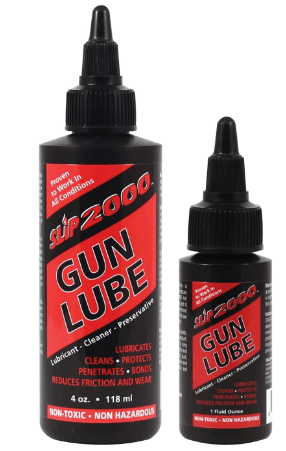
A 100% pure synthetic CLP that is free of petroleum, silicone, and PTFE, offering clean performance without attracting dust or dirt.
Features:
- Bonds with metal to prevent fouling.
- Suitable for all types of firearms.
- Performs across extreme temperatures.
- Long-lasting protection without gumming up.
4. Ballistol Multi-Purpose Oil
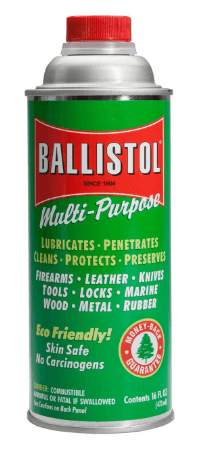
A century-old, all-purpose oil originally developed for military firearms, known for its versatility and safety.
Features:
- Cleans, lubricates, and protects various surfaces.
- Emulsifies upon contact with water to form a protective layer.
- Carcinogen-free formula with a mild scent.
5. CorrosionX Gun Oil
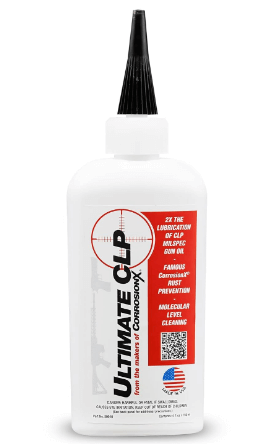
A highly durable lubricant that excels in providing long-lasting corrosion protection, even under extreme conditions.
Features:
- Does not burn off under heavy use.
- Excellent anti-corrosion properties.
- Ideal for protecting critical moving parts.
Related Engine Burning Oil Treatment(5 Best Additive to Stop Oil Burning)
Why Engine Oil? A Breakdown of Its Properties
Engine oil is designed to reduce friction, prevent corrosion, and handle high temperatures in automotive engines. These properties align closely with the needs of firearms, which operate under conditions of heat, friction, and exposure to moisture.
- Lubrication Efficiency: Engine oils are known for their high lubricity, ensuring that moving parts glide smoothly with minimal wear.
- Heat Tolerance: Firearms, especially semi-automatic and automatic ones, generate significant heat during firing. Engine oil is engineered to withstand high temperatures without breaking down quickly.
- Corrosion Protection: Engine oil helps form a protective barrier that can shield the metal parts of a gun from rust and other corrosive elements.
Read Can I Use Engine Restorer and Triax Oil Additive Together
The Types of Engine Oil Suitable for Guns
Choosing the right type of engine oil for your firearm matters. Not all engine oils are created equal, and using the wrong type could result in suboptimal performance.
- Conventional Engine Oil: Affordable and widely available, conventional oil provides basic lubrication and corrosion resistance. However, it may not offer the best long-term protection.
- Synthetic Engine Oil: This type offers superior performance under high temperatures and has better stability over time. Synthetic oils also tend to be cleaner, reducing the buildup of carbon and other residues in gun mechanisms.
- Blended Oils: A mix of conventional and synthetic oils, these provide a middle ground, balancing cost and performance.
Related Can You Mix Engine Oil Brands(Read This Before Mixing Oil)
Pros and Cons of Using Engine Oil on Firearms
Before swapping out gun-specific lubricants for engine oil, it’s essential to weigh the pros and cons.
Pros:
- Cost-Effective: Engine oil is typically less expensive than specialized gun oils, especially when bought in larger quantities.
- Availability: Easily found in automotive stores, engine oil can be a convenient alternative in situations where gun oil isn’t accessible.
- Multi-Purpose Use: If you’re already using engine oil for your vehicle, it serves as a practical dual-purpose product.
Cons:
- Viscosity Issues: Engine oil is generally thicker than gun oil. While it provides excellent lubrication, it might attract dust and debris if used excessively.
- Additives: Some engine oils contain additives that might not be suitable for firearm metals and can leave a residue.
- Temperature Sensitivity: Certain engine oils may not perform as well in extremely cold conditions, potentially affecting firearm operation.
Read CAT 259D Engine Oil Type(Recommended by Manufacturer)
Engine Oil vs Gun-Specific Oils
To better understand why some gun owners opt for engine oil, it helps to compare its properties against those of gun-specific oils:
| Property | Engine Oil | Gun-Specific Oil |
|---|---|---|
| Temperature Range | High, but varies by type | Optimized for firearm use |
| Lubrication Quality | Excellent, especially synthetic | Tailored for firearms |
| Corrosion Resistance | Strong, particularly in synthetic variants | Usually superior due to specialized formulation |
| Residue | Can leave residue due to additives | Low-residue formulas common |
| Price | Generally lower | Often higher |
How to Apply Engine Oil to Your Gun
Using engine oil on firearms involves a few basic steps to ensure effective application without over-lubrication:
- Disassemble Your Firearm: Always ensure the gun is unloaded and disassemble it according to the manufacturer’s instructions.
- Clean the Parts: Remove any old oil, dirt, or residue from the gun parts with a clean cloth and solvent if necessary.
- Apply Engine Oil Sparingly: Use a small amount of oil on a cloth or a brush to apply a thin layer to the gun’s moving parts and critical points of contact. Remember, more is not better; excess oil can attract dirt.
- Wipe Off Excess: Gently wipe away any excess oil with a clean rag to prevent dust and debris from sticking to the gun.
- Reassemble and Test: Reassemble the gun and perform a function check to ensure that everything operates smoothly.
Read Can You Mix Different Weights of Oil(Hack or a Disaster)
Safety Considerations and Best Practices
When using engine oil on firearms, it’s important to follow some best practices to ensure safety and proper firearm function:
- Select an Oil Without Harmful Additives: Check that the engine oil you’re using does not contain additives that could harm your gun’s metal surfaces or affect performance.
- Use in Moderation: Applying too much engine oil can lead to buildup, which might impede gun function, especially in dusty or sandy environments.
- Check Regularly: Because engine oil may not last as long on firearms as gun-specific lubricants, regular inspections and maintenance are necessary.
Situations Where Engine Oil Is a Good Fit
There are scenarios where using engine oil makes perfect sense:
- Budget Constraints: If cost-saving is a priority, engine oil provides a practical alternative without sacrificing too much in terms of performance.
- Temporary Solutions: Engine oil is an excellent temporary solution when gun oil is unavailable or in short supply.
- High-Volume Shooting: For those who practice frequently and need to lubricate firearms often, using more affordable oil can reduce costs.
Read Kohler 25 HP Engine Oil Type(By Manufacturer)
Final Word
While engine oil can be an effective lubricant for firearms, it’s essential to understand its properties and limitations. For those who prioritize cost savings or need a temporary solution, engine oil can serve as a viable option. However, attention should be given to its type and application technique to maintain the optimal performance and lifespan of the firearm.

